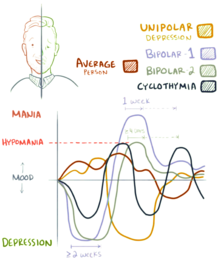| Mr. Ibrahem/Mania | |
|---|---|
| Other names | Manic syndrome, manic episode, manic phase |
 | |
| Graphical representation of mania and hypomania | |
| Specialty | Psychiatry |
| Symptoms | Increased talkativeness, rapid speech, easy distractibility, hyperactivity, decreased need for sleep[1] |
| Complications | Spending excessive money, starting businesses unprepared, traveling, promiscuity[1] |
| Usual onset | 25 years old[1] |
| Duration | > 1 week[1] |
| Differential diagnosis | Hypomania, substance misuse, schizophrenia, anxiety, obsessive-compulsive disorder[1] |
| Treatment | Antipsychotics, lithium[1] |
| Prognosis | Generally good[1] |
| Frequency | 4% at some point in time[1] |
Mania is a state of abnormally elevated mood and increased energy.[2] Symptoms often include increased talkativeness, rapid speech, easy distractibility, hyperactivity, and a decreased need for sleep.[1] This occurs to a degree that functioning is negatively affected.[1] Complications may include spending excessive money, starting businesses unprepared, traveling, or promiscuity.[1]
A single episode of mania is sufficient to make the diagnosis of bipolar I disorder.[1] The underlying cause is not clear but is believed to involved a combination of genetics, social, and psychological factors.[1] Diagnosis requires the symptoms to be present for at least a week or be of a degree that hospitalization is required.[2][1] Hypomania is less severe and may occur for shorter periods.[1]
Treatment may include antipsychotics such as haloperidol and lithium.[1] Outcomes are generally good.[1] Mania affects about 4% of people at some point in time.[1] Males and females are affected equally frequently.[1] The typical age of onset is 25.[1] Mania was first clearly described by Hippocrates around 400 BC.[3]
References edit
- ^ a b c d e f g h i j k l m n o p q r s t Dailey, MW; Saadabadi, A (January 2020). "Mania". PMID 29630220.
{{cite journal}}: Cite journal requires|journal=(help) - ^ a b Diagnostic and Statistical Manual of Mental Disorders (Fifth ed.). American Psychiatric Association. 2013. pp. 124. doi:10.1176/appi.books.9780890425596.156852. ISBN 978-0-89042-555-8.
{{cite book}}: Cite has empty unknown parameter:|1=(help) - ^ Jr, Carlos A. Zarate; Manji, Husseini K. (2009). Bipolar Depression: Molecular Neurobiology, Clinical Diagnosis and Pharmacotherapy. Springer Science & Business Media. p. 4. ISBN 978-3-7643-8567-5. Archived from the original on 2021-08-29. Retrieved 2021-02-19.